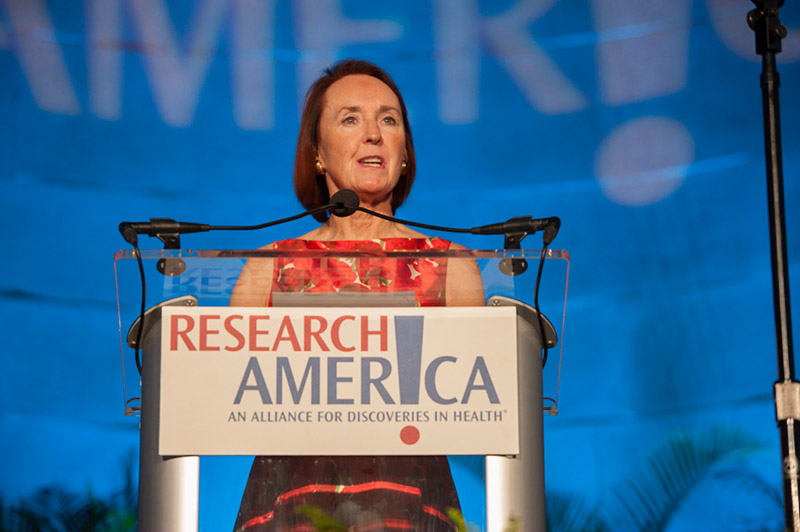Competition, Communication, Candor


Dear Research Advocate,
This week, amidst the Delta-driven surge in the COVID-19 pandemic, the world watched the closing ceremonies of the Tokyo 2020 Olympic Games. One of the most significant health stories to come out of the Olympics — at least for audiences watching in the U.S. — was how the athletes advanced the public discourse on mental health.
2016 Olympic medalist Laurie Hernandez played a prominent role in that important conversation, and we are thrilled to announce that she will speak on mental health awareness at our upcoming 2021 National Health Research Forum!
Also joining us are key federal officials, including Reps. Diana DeGette (D-CO) and Fred Upton (R-MI), White House OSTP Director Eric Lander, NIH Director Francis Collins, CDC Director Rochelle Walensky, NIAID Director Anthony Fauci, NCI Director Ned Sharpless, and FDA leaders Jacqueline Corrigan-Curay, Peter Marks, and Julia Beaver. We’ll also welcome R&D leaders and top national media as we explore the theme “Straight Talk: Fighting Health Threats Faster.”
As always, our goal with the Forum — which is being held virtually September 13-15 — is not to dust off an old script. During this interactive event, we hope our participants — audience included — will challenge the status quo, taking a clear-eyed look at what is working and what is not in crucial areas of health need. Register now to join us!
You Still Have Time!: One feature of the Forum is an op-ed competition that provides early career researchers interested in exercising their science communication skills the opportunity to compete for cash prizes. Your opinion piece can focus on any science-relevant issue you choose: How do we disentangle science from ideological, policy, and political debates? What health threat isn’t receiving the attention it deserves? Why isn’t medical progress a kitchen table issue? If you’re an early career researcher, choose a topic and get writing!
Winners will be announced during the Forum. The only hitch? You need to work fast: the deadline for submissions is COB Wednesday, August 18. Read our submission guidelines and contact Matt Martin with any questions.
Speaking of Science Communication: At the annual meeting of the American Association of Colleges of Pharmacy, I had the privilege of moderating a discussion about dis- and misinformation with seasoned science communicators Dr. Georges Benjamin, MD, Executive Director of APHA, and Bruce Gellin, MD, Chief of Global Public Health Strategy at the Rockefeller Foundation.
Georges (a Research!America Board member) and Bruce made a compelling case that if the science community as a whole — public, private, academic, nonprofit — doesn’t step up, the science-focused disinformation epidemic will get worse, not better. Watch a recording of this frank discussion, and access resources to help you combat disinformation in our latest blog post.
On the Hill: Following the passage of a bipartisan infrastructure bill, the Senate has adopted a $3.5 trillion budget resolution framework (text; summary). The HELP committee allocation is approximately $700 billion and according to reports, includes $30 billion over 10 years for pandemic preparedness. The topline numbers for FY22 defense and non-defense discretionary funding were not revealed, which means we do not yet have a sense of the Senate’s proposed funding levels for key health research agencies.The House is expected to return from its recess by August 23 to consider the resolution.
Separately, Congress has yet to act on the debt ceiling; September looks to be a busy and tense month on Capitol Hill. Take a few minutes this week to tweet your Senators and Representative, asking them to become vocal champions for the federal funding and policy environment needed to drive faster medical progress.
Taking Action on Climate Change: Even as medical professionals combat COVID-19, they are taking on another existential health threat: climate change. The NIH has issued a Request for Information on how the Institutes can best support research on the effects of climate change on human health. The deadline for submissions is August 30.
Learn more about the health implications of climate change from The Medical Society Consortium on Climate and Health, an alliance that brings together associations representing over 600,000 clinical practitioners and offers a wealth of education and advocacy resources.
Climate change is also, clearly, a compelling reason to dramatically boost science & technology (S&T) funding and capacity across the spectrum of disciplines working to combat this threat. Has your organization endorsed the S&T Action Plan? It’s a set of recommendations for achieving the S&T capabilities our nation urgently needs.
Stay well, stay safe, and stay connected.
Sincerely,
Mary Woolley




